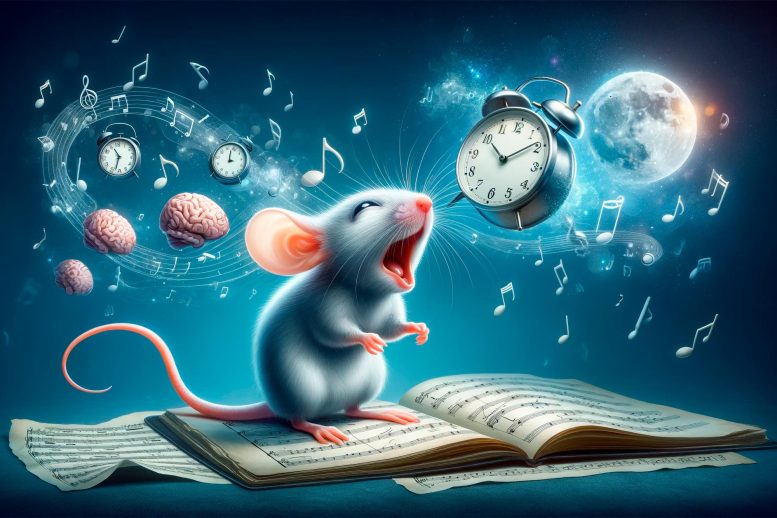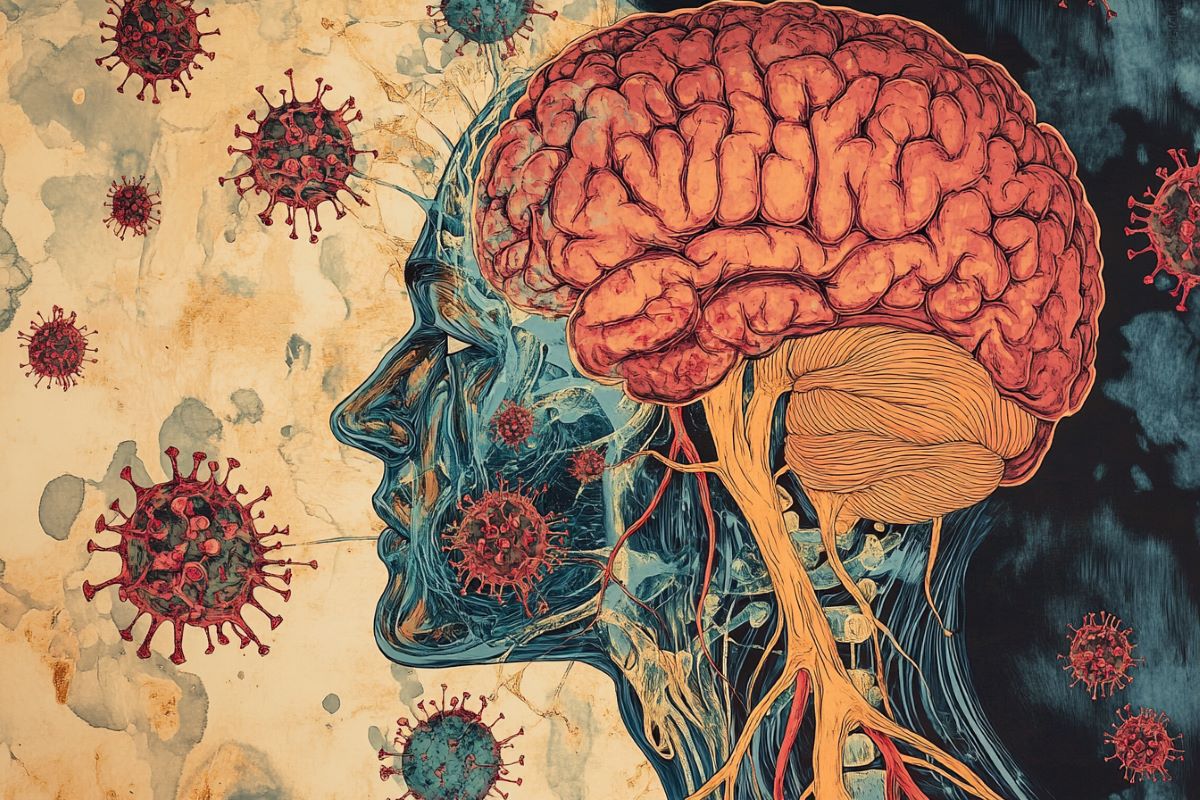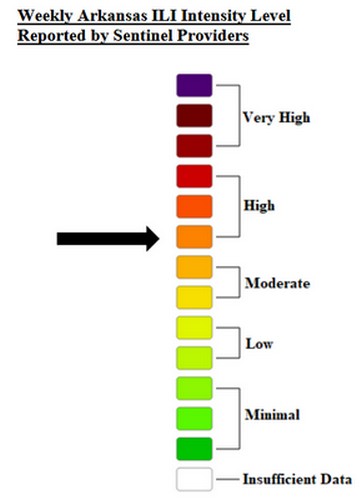 Recent research indicates that our brains can adapt our time perception to meet our needs, a discovery made through the study of Alston’s singing mice. Credit: SciTechDaily.comA study on Alston’s singing mice reveals that the brain can adjust our perception of time, a finding with significant implications for understanding complex brain functions and potential applications in technology and education.Life has a challenging tempo. Sometimes, it moves faster or slower than we’d like. Nevertheless, we adapt. We pick up the rhythm of conversations. We keep pace with the crowd walking a city sidewalk.“There are many instances where we have to do the same action but at different tempos. So the question is, how does the brain do it,” says Cold Spring Harbor Laboratory Assistant Professor Arkarup Banerjee.Unraveling Brain MechanismsNow, Banerjee and collaborators have discovered a new clue that suggests the brain distorts our processing of time to suit our needs. And it’s partly thanks to a noisy critter from Costa Rica named Alston’s singing mouse.This special breed is known for its human-audible vocalizations, which last several seconds. One mouse will sing out a longing cry, and another will respond with a tune of its own. Notably, the song varies in length and speed. Banerjee and his team looked to determine how neural circuits in the mice’s brains govern their song’s tempo.
Recent research indicates that our brains can adapt our time perception to meet our needs, a discovery made through the study of Alston’s singing mice. Credit: SciTechDaily.comA study on Alston’s singing mice reveals that the brain can adjust our perception of time, a finding with significant implications for understanding complex brain functions and potential applications in technology and education.Life has a challenging tempo. Sometimes, it moves faster or slower than we’d like. Nevertheless, we adapt. We pick up the rhythm of conversations. We keep pace with the crowd walking a city sidewalk.“There are many instances where we have to do the same action but at different tempos. So the question is, how does the brain do it,” says Cold Spring Harbor Laboratory Assistant Professor Arkarup Banerjee.Unraveling Brain MechanismsNow, Banerjee and collaborators have discovered a new clue that suggests the brain distorts our processing of time to suit our needs. And it’s partly thanks to a noisy critter from Costa Rica named Alston’s singing mouse.This special breed is known for its human-audible vocalizations, which last several seconds. One mouse will sing out a longing cry, and another will respond with a tune of its own. Notably, the song varies in length and speed. Banerjee and his team looked to determine how neural circuits in the mice’s brains govern their song’s tempo. In collaboration with New York University’s Michael Long and Stanford University’s Feng Chen and Shaul Druckmann, Cold Spring Harbor Laboratory neuroscientist Arkarup Banerjee is using singing mice, like the one shown here, to understand how our brains control timing and communication. These studies may offer valuable insights into neurological conditions that affect our ability to speak, including strokes and communication disorders. Credit: Banerjee lab/Cold Spring Harbor LaboratoryThe researchers pretended to engage in duets with the mice while analyzing a region of their brains called the orofacial motor cortex (OMC). They recorded neurons’ activity over many weeks. They then looked for differences among songs with distinct durations and tempos.They found that OMC neurons engage in a process called temporal scaling. “Instead of encoding absolute time like a clock, the neurons track something like relative time,” Banerjee explains. “They actually slow down or speed up the interval. So, it’s not like one or two seconds, but 10%, 20%.”Broader Implications and DiscoveriesThe finding offers new insight into how the brain generates vocal communication. But Banerjee suspects its implications go beyond language or music. It might help explain how time is computed in other parts of the brain, allowing us to adjust various behaviors accordingly. And that might tell us more about how our beautifully complex brains work.“It’s this three-pound block of flesh that allows you to do everything from reading a book to sending people to the moon,” says Banerjee. “It provides us with flexibility. We can change on the fly. We adapt. We learn. If everything was a stimulus-response, with no opportunity for learning, nothing that changes, no long-term goals, we wouldn’t need a brain. We believe the cortex exists to add flexibility to behavior.”In other words, it helps make us who we are. Banerjee’s discovery may bring science closer to understanding how our brains enable us to interact with the world. The possible implications for technology, education, and therapy are as unlimited as our imagination.Reference: 30 January 2024, Nature Neuroscience.
In collaboration with New York University’s Michael Long and Stanford University’s Feng Chen and Shaul Druckmann, Cold Spring Harbor Laboratory neuroscientist Arkarup Banerjee is using singing mice, like the one shown here, to understand how our brains control timing and communication. These studies may offer valuable insights into neurological conditions that affect our ability to speak, including strokes and communication disorders. Credit: Banerjee lab/Cold Spring Harbor LaboratoryThe researchers pretended to engage in duets with the mice while analyzing a region of their brains called the orofacial motor cortex (OMC). They recorded neurons’ activity over many weeks. They then looked for differences among songs with distinct durations and tempos.They found that OMC neurons engage in a process called temporal scaling. “Instead of encoding absolute time like a clock, the neurons track something like relative time,” Banerjee explains. “They actually slow down or speed up the interval. So, it’s not like one or two seconds, but 10%, 20%.”Broader Implications and DiscoveriesThe finding offers new insight into how the brain generates vocal communication. But Banerjee suspects its implications go beyond language or music. It might help explain how time is computed in other parts of the brain, allowing us to adjust various behaviors accordingly. And that might tell us more about how our beautifully complex brains work.“It’s this three-pound block of flesh that allows you to do everything from reading a book to sending people to the moon,” says Banerjee. “It provides us with flexibility. We can change on the fly. We adapt. We learn. If everything was a stimulus-response, with no opportunity for learning, nothing that changes, no long-term goals, we wouldn’t need a brain. We believe the cortex exists to add flexibility to behavior.”In other words, it helps make us who we are. Banerjee’s discovery may bring science closer to understanding how our brains enable us to interact with the world. The possible implications for technology, education, and therapy are as unlimited as our imagination.Reference: 30 January 2024, Nature Neuroscience.
DOI: 10.1038/s41593-023-01556-5
Singing Mice Unlock the Mysteries of Brain Time Perception













:max_bytes(150000):strip_icc()/GettyImages-1926668948-0a7936b2874a494c96ecc717a8b03650.jpg)

